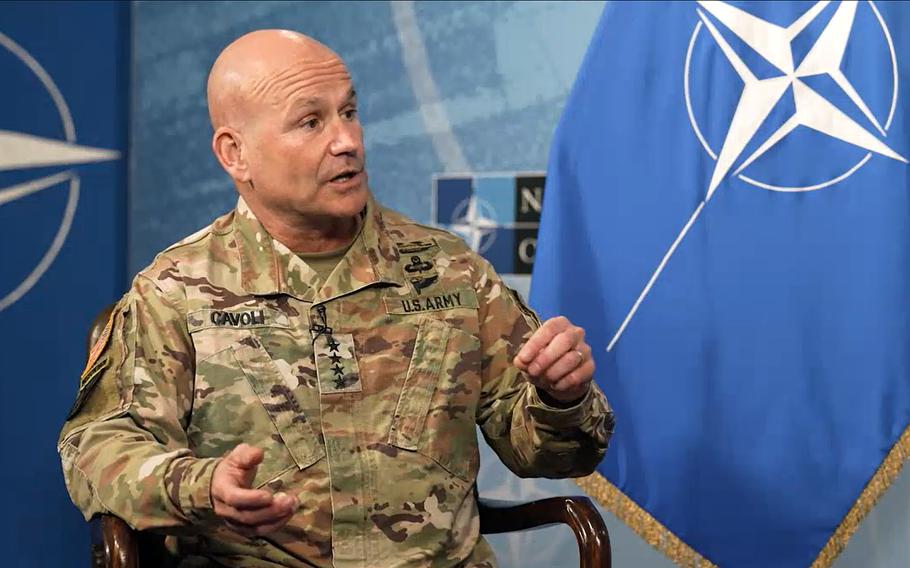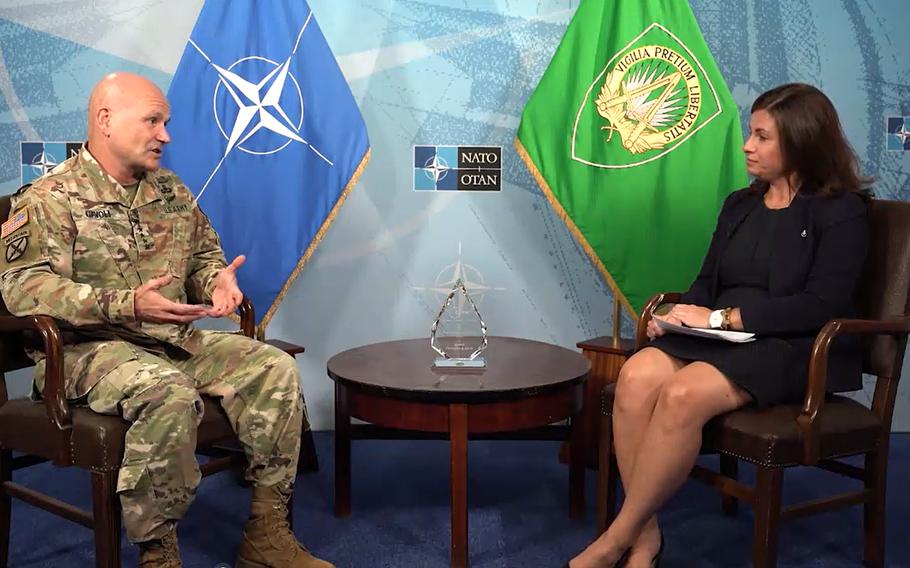
Gen. Christopher Cavoli, NATO's supreme allied commander in Europe, gives remarks Sept. 27, 2023, at a security forum hosted by the Center for European Policy Analysis at Supreme Headquarters Allied Powers Europe in Mons, Belgium. (X/Center for European Policy Analysis)
The war in Ukraine is showing how small investments in cheap drones can have an outsized effect on the battlefield, the top U.S. military commander in Europe said Wednesday.
Ukrainian forces have added a new dimension to their fighting with “first person” and “one-way attack” drones that have delivered “huge results on the battlefield,” U.S. European Command’s Gen. Christopher Cavoli said from his headquarters in Belgium, where he serves in his role as NATO supreme allied commander.
“One of the biggest results (a simple drone) is it gives people a feeling of insecurity on the other side,” Cavoli said. “It’s not just that you got hit with the drone, it’s that you kind of didn’t hear it coming. And every time you hear a buzzing sound in the air, it fills you with dread.”
The result is “a paralytic effect” on the adversary, he said.
Cavoli’s comments came during a discussion at a security forum hosted by the Center for European Policy Analysis.
Numerous allied teams have been assembled to learn from Russia’s full-scale invasion, which was launched in February 2022.
The U.S. training of Ukrainian forces at various bases in Europe also works in reverse, with American personnel learning firsthand from the combatants themselves, Cavoli said.

Gen. Christopher Cavoli, NATO's supreme allied commander in Europe, talks with Catherine Sendak of the Center for European Policy Analysis on Sept. 27, 2023. Speaking from his headquarters in Belgium, Cavoli shared lessons that the Russia-Ukraine war has taught allies. He highlighted Ukraine's innovative use of drones. (X/Center for European Policy Analysis)
Electronic warfare is an area where Cavoli said allies are gaining new insights, but he declined to go into detail for security reasons.
“There are disruptive technologies out there, and we’re studying those closely, and we hope to adopt some of them ourselves,” he said.
The grinding trench warfare not seen in Europe for many decades has left both Russia and Ukraine looking to friendly nations to supply them with weapons such as artillery shells and ammunition.
U.S. officials, including President Joe Biden, have acknowledged that the enormous amount of military aid to Ukraine has strained weapons stocks, highlighting the need to strengthen the industrial base.
“As soon as you get past the first couple of months of a war and it begins to protract, it becomes a competition of production,” Cavoli said. “So, the industrial bases of our nations are something that we’re all studying even harder.”
Meanwhile, a key development in NATO is the establishment of a new generation of regional defense plans, agreed to by member countries at the alliance’s July summit in Vilnius.
The next step will be building the necessary force structure to fully implement the strategy, Cavoli said.
Common during the Cold War, territorial defense plans fell by the wayside in the years that followed. But Russia’s unprovoked invasions of Ukraine in 2014 and 2022 refocused NATO on its original purpose of territorial defense.
“It’ll be a challenge to build out that force structure,” Cavoli said. “But nevertheless, at least we have the blueprint.”